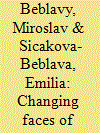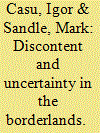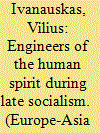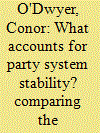|
|
|
Sort Order |
|
|
|
Items / Page
|
|
|
|
|
|
|
| Srl | Item |
| 1 |
ID:
131149


|
|
|
|
|
| Publication |
2014.
|
| Summary/Abstract |
The paper looks at the European Union's impact on corruption in Slovakia, both before and after the country's accession to the European Union. It shows that even though pre-accession channels of influence diminish or disappear, membership brings new means of influence. Our methodology looks beyond institutional changes and explicit anti-corruption mechanisms. Before 1999, the European Union's influence on corruption was close to zero, and between 1999 and 2004, its influence was strong and positive. Post-accession developments are more ambiguous, but despite an apparent worsening of corruption after 2004, we observe a transformation rather than a loss of European Union influence.
|
|
|
|
|
|
|
|
|
|
|
|
|
|
|
|
| 2 |
ID:
131154


|
|
|
|
|
| Publication |
2014.
|
| Summary/Abstract |
The article uses a variety of documents, published and unpublished, to explore the 1923 arrest, interrogation and 'trial' of Mirsaid Sultan-Galiev, often considered the Bolsheviks' leading expert on Muslim affairs in the early Soviet period. Contrary to the historiography on this crucial moment in the development of Soviet nationality policy, I argue that Sultan-Galiev was not Stalin's 'first victim'. Rather, responding to the vagaries of Soviet nationality policy, he did indeed violate party discipline in a number of ways, and was engaged in developing conspiratorial ties outside of the party. In fact, the party leaders, and Stalin in particular, treated him less severely than they could have.
|
|
|
|
|
|
|
|
|
|
|
|
|
|
|
|
| 3 |
ID:
131156


|
|
|
|
|
| Publication |
2014.
|
| Summary/Abstract |
This article examines reactions to de-Stalinisation in Soviet Moldavia between February 1956 and March 1957. The article is based on evidence from the archives of both the former Communist Party of Moldavia and the Moldavian KGB. It highlights the uncertainty there was at local levels because of the denunciation of Stalin. Local party reports demonstrate concern about the activities of religious activists, Western propaganda, nationalism and disaffected youth. The Hungarian revolution of 1956 caused the party to change tack, and to begin a clampdown. These reports highlight that Soviet rule had very shallow roots in Moldavia.
|
|
|
|
|
|
|
|
|
|
|
|
|
|
|
|
| 4 |
ID:
131153


|
|
|
|
|
| Publication |
2014.
|
| Summary/Abstract |
The current study addresses health care reform in transitional countries and explores the impact of out-of-pocket payments on access to maternal health services drawing on Kazakhstan's case. Data on out-of-pocket payments and access to maternity care were generated through qualitative in-depth interviews conducted in Almaty during the period 2009-2010. The results indicate that while health sector reform was designed to improve the quality of care and equity, the introduction of official user charges accompanied by a rapid growth of informal payments created financial barriers that prevented women from accessing maternal services leading to reduction in utilisation of maternity care.
|
|
|
|
|
|
|
|
|
|
|
|
|
|
|
|
| 5 |
ID:
131157


|
|
|
|
|
| Publication |
2014.
|
| Summary/Abstract |
Writers were among the most publicly recognised intellectuals in the USSR. They actively participated in indoctrination practices that reflected strict mechanisms of control and censorship and provided prestige and authority in society. This article analyses how local writers in Lithuania who were part of the establishment during late socialism developed a multi-faceted relationship with the system. The perspective of different generations reveals the rise of ethnic (local) interests and the disconnection of everyday life from official goals. It also shows that writers who worked in official channels reduced their participation in indoctrination processes and significantly influenced the mobilisation of national identity.
|
|
|
|
|
|
|
|
|
|
|
|
|
|
|
|
| 6 |
ID:
131151


|
|
|
|
|
| Publication |
2014.
|
| Summary/Abstract |
This article examines Belarusian strategies in the bilateral politico-military alliance with Russia, focusing on the issue of recognition of Abkhazia and South Ossetia, in addition to the evolution of the Collective Security Treaty Organisation. It argues that the approaches interpreting the alliance as a response to decisions of external actors cannot fully account for the disagreements between the parties. The analysis of Belarusian strategies demonstrates how the decisions of external actors, such as the European Union and to a certain extent the North Atlantic Treaty Organisation, function as bargaining chips for the Belarusian leadership. Due to the intra-alliance security dilemma, external actors have at times even weakened the alliance rather than automatically inducing its cohesion.
|
|
|
|
|
|
|
|
|
|
|
|
|
|
|
|
| 7 |
ID:
131148


|
|
|
|
|
| Publication |
2014.
|
| Summary/Abstract |
Why do party systems stabilise quickly in some new democracies while others remain in extended flux? As a core variable of comparative politics, party system stability has led scholars to generate various theoretical explanations, but consensus is still lacking. Given its widely divergent party systems, postcommunist Europe presents an important opportunity to revisit stability's determinants. Applying hypotheses derived from theories about competition in multidimensional policy spaces, I find that they better explain variation in a 14-case sample than contending hypotheses about the electoral system, economic performance, constitutional design, political culture, or previous democratic experience.
|
|
|
|
|
|
|
|
|
|
|
|
|
|
|
|
|
|
|
|
|